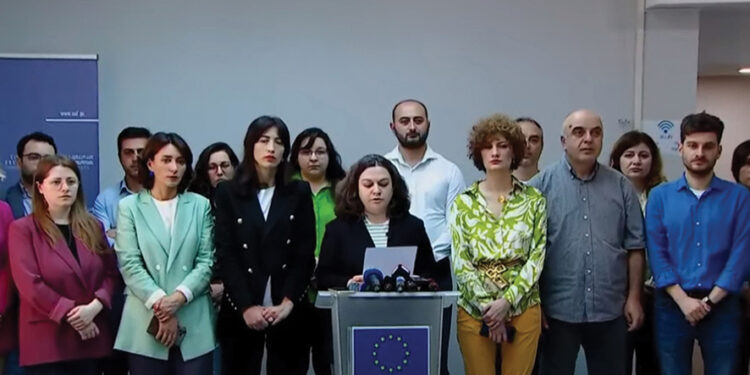A coalition of Georgian non-governmental organizations is raising the alarm over what they describe as an unprecedented and unlawful attempt by the state to access sensitive personal data of citizens under their protection. In a joint briefing held on June 17, the NGOs accused the Anti-Corruption Bureau of initiating demands through what they referred to as the “Murusidze court”—a term used by critics to describe a judiciary they believe is increasingly aligned with pro-Russian and anti-democratic governance.
The data requests reportedly target vulnerable groups, including victims of torture, survivors of domestic violence, students, pensioners, journalists, and teachers, with authorities allegedly seeking names, photos, financial information, and even health records.
“Without any legal basis, they are demanding we betray the trust of those we serve,” said the NGOs. “We will not comply—even if it means our persecution or imprisonment.” They characterized the move as a blatant attempt to implement Russian-style laws aimed at dismantling Georgia’s civil society and undermining its European integration path.
The organizations pledged legal resistance and reaffirmed their commitment to defending fundamental human rights.
In response, Razhden Kuprashvili, head of the Anti-Corruption Bureau, dismissed the allegations as part of a “deliberate disinformation campaign.” Speaking at a press briefing on Thursday, Kuprashvili insisted that the bureau’s actions are fully legal and focused on ensuring transparency among individuals and organizations engaged in political activities.
“Our aim is not to violate anyone’s privacy,” Kuprashvili said. “We are investigating how some entities use foreign grants or operate politically under the cover of other missions. The public deserves to know who is influencing political processes.”
He emphasized that the bureau is not targeting citizens, but is instead working to reveal hidden political agendas and ensure that organizations are accountable in their use of funds and public influence.
Despite Kuprashvili’s assurances, civil society groups argue that the government is using transparency laws as tools of intimidation, disproportionately targeting organizations critical of the ruling party. Human rights defenders warn that the campaign mirrors similar tactics seen in authoritarian regimes to weaken independent voices and suppress dissent.
“The state is weaponizing oversight mechanisms to create fear and silence criticism,” said one NGO leader, warning that these actions pose a direct threat to democracy in Georgia.
By Team GT














